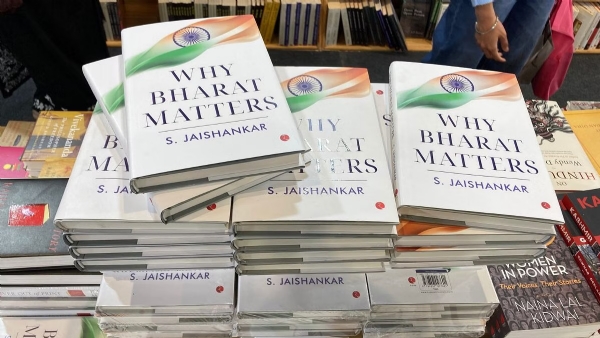Why Bharat Matters: A Profound Insight into India's Global Significance
In his thought-provoking book, "Why Bharat Matters," Dr. S. Jaishankar, the Indian Foreign Minister, offers a compelling exploration of India's global significance in the 21st century. Drawing from his vast experience as a diplomat and his deep understanding of international relations, Dr. Jaishankar presents a comprehensive analysis of India's role and its potential to shape the world order.
"Why Bharat Matters" covers many other aspects that make it a noteworthy book:
Geopolitical Analysis: Dr. Jaishankar provides a comprehensive examination of India's geopolitical position. He analyzes India's relationships with key global powers, including the United States, China, and Russia, and explores the implications of these dynamics for India's foreign policy choices.
Regional Dynamics: The book delves into India's relationships with its immediate neighbors, such as Pakistan, Bangladesh, Sri Lanka, and Nepal. Dr. Jaishankar explores the complexities and opportunities within these regional dynamics, emphasizing the importance of fostering stability and cooperation.
Multilateralism and Global Governance: Dr. Jaishankar discusses India's active engagement in multilateral forums, such as the United Nations, G20, and BRICS. He highlights India's role in shaping global governance and advocates for a more inclusive and representative international order.

Security Challenges: The book addresses the security challenges faced by India, including terrorism, cyber threats, and maritime security. Dr. Jaishankar provides insights into India's approach to countering these challenges and emphasizes the need for collaborative efforts on a global scale.
Cultural Diplomacy: Dr. Jaishankar explores the soft power potential of India's rich cultural heritage. He highlights the role of cultural diplomacy in promoting India's image abroad and deepening people-to-people connections.
Economic Diplomacy: The book examines India's economic diplomacy efforts, including trade agreements, investment initiatives, and the promotion of entrepreneurship. Dr. Jaishankar underscores India's economic potential and its aspirations to become a global economic powerhouse.
Climate Change and Sustainable Development: Dr. Jaishankar acknowledges the importance of addressing climate change and achieving sustainable development. He discusses India's commitment to renewable energy, climate diplomacy, and its efforts to balance economic growth with environmental responsibility.
Historical Context: Dr. Jaishankar provides a historical context to India's global significance by highlighting its ancient civilizational heritage. He explores the contributions of India's ancient philosophers, scientists, and scholars, emphasizing the long-standing cultural and intellectual influence that India has had on the world.
Diplomatic Challenges: The book delves into the challenges that India faces in its diplomatic endeavors. Dr. Jaishankar discusses issues such as balancing competing interests, managing complex relationships, and navigating global power shifts. He offers insights into the diplomatic strategies employed by India to overcome these challenges.
Soft Power and Public Diplomacy: Dr. Jaishankar emphasizes the importance of India's soft power in enhancing its global influence. He discusses India's cultural exports, such as yoga, Bollywood, and cuisine, and how they contribute to shaping positive perceptions of India and fostering stronger international relations.
Diaspora Engagement: The book acknowledges the significance of India's diaspora and its role in India's global outreach. Dr. Jaishankar explores how the Indian diaspora, which is spread across the globe, acts as a bridge between India and their adopted countries, contributing to economic, cultural, and political ties.
Strategic Autonomy: Dr. Jaishankar emphasizes the concept of strategic autonomy in India's foreign policy. He explains how India seeks to maintain its independence and decision-making capacity while engaging with multiple global powers and pursuing its national interests.
India's Neighborhood First Policy: The book highlights India's "Neighborhood First" policy, which underscores the importance of fostering strong relationships with its neighboring countries. Dr. Jaishankar discusses the rationale behind this policy and the efforts India has made to enhance regional cooperation and connectivity.
Crisis Management and Humanitarian Diplomacy: Dr. Jaishankar provides insights into India's approach to crisis management and humanitarian diplomacy. He discusses India's role in providing aid and assistance during natural disasters and humanitarian crises, showcasing India's commitment to global cooperation and its willingness to contribute to international peace and stability.
Technology and Innovation: The book explores India's growing role in technology and innovation. Dr. Jaishankar discusses India's advancements in areas such as information technology, space exploration, and renewable energy, and how these contribute to India's global standing as a knowledge hub.
Indo-Pacific and Security Architecture: Dr. Jaishankar discusses India's engagement in the Indo-Pacific region and its approach to shaping the security architecture in the area. He explores India's partnerships with like-minded countries, such as the Quad (India, United States, Japan, and Australia), and emphasizes the importance of a rules-based order and freedom of navigation in the region.
Counterterrorism and Global Security: The book delves into India's efforts in countering terrorism and its role in global security. Dr. Jaishankar highlights the various challenges posed by terrorism and emphasizes the need for international cooperation to combat this menace. He also discusses India's contributions to peacekeeping operations under the United Nations.

No comments:
Post a Comment